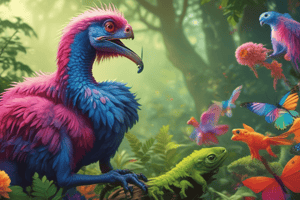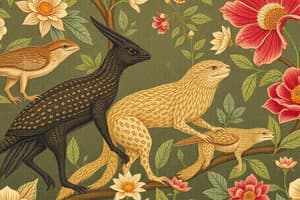Podcast
Questions and Answers
What term refers to physical or behavioral traits that help organisms better survive and reproduce in their specific environments?
What term refers to physical or behavioral traits that help organisms better survive and reproduce in their specific environments?
- Variation
- Evolution
- Adaptation (correct)
- Competition
Which process explains how species evolve over time through genetic changes that increase their chances of survival and reproduction in a particular environment?
Which process explains how species evolve over time through genetic changes that increase their chances of survival and reproduction in a particular environment?
- Competition
- Natural Selection (correct)
- Evolution
- Variation
What do we call differences among individuals within a species?
What do we call differences among individuals within a species?
- Adaptation
- Competition
- Evolution
- Variation (correct)
When do adaptations typically occur within a population?
When do adaptations typically occur within a population?
In the context of evolution, what does competition refer to?
In the context of evolution, what does competition refer to?
Which term describes the process where certain advantageous traits become more common within a population over time?
Which term describes the process where certain advantageous traits become more common within a population over time?
What highlights the importance of advantageous traits in allowing individuals to survive and reproduce in their environments?
What highlights the importance of advantageous traits in allowing individuals to survive and reproduce in their environments?
What process leads to the spread of advantageous alleles throughout a population over subsequent generations?
What process leads to the spread of advantageous alleles throughout a population over subsequent generations?
Which factor plays a crucial role in shaping the diversity of life on Earth through processes like adaptation and competition?
Which factor plays a crucial role in shaping the diversity of life on Earth through processes like adaptation and competition?
How do advantageous traits spread across an entire population according to the text?
How do advantageous traits spread across an entire population according to the text?
What determines an individual's ability to acquire food, avoid predators, and find suitable mates according to the text?
What determines an individual's ability to acquire food, avoid predators, and find suitable mates according to the text?
Which process involves species changing over time through gradual accumulation of variations and selection based on environmental factors?
Which process involves species changing over time through gradual accumulation of variations and selection based on environmental factors?
Flashcards are hidden until you start studying
Study Notes
Natural Selection
Natural selection is a fundamental process driving evolution. It was first introduced by Charles Darwin based on his observations of nature. This concept explains how species evolve over time through genetic changes that increase their chances of survival and reproduction in a particular environment.
Adaptation
Adaptations are physical or behavioral traits that help organisms better survive and reproduce in their specific environments. These adaptations can occur due to natural selection when certain advantageous traits become more common within a population. For example, birds living in colder climates have thicker feathers as an adaptation to stay warm. Over many generations, these birds with thicker feathers will have a higher chance of surviving and passing down this trait, leading to a gradually warmer population with thicker feathers.
Variation
Variation refers to differences among individuals within a species. Some traits offer advantages under certain conditions while others may give disadvantages. When populations vary, some members may have traits that help them survive and reproduce better in their specific environments. These individuals pass on their favorable traits to future generations, causing the proportion of individuals with those traits to increase.
Competition
Competition occurs when two or more individuals or species require the same resources to live and reproduce. In such situations, individuals with advantageous traits tend to outcompete others for resources like food, mates, or nesting sites. Those individuals who successfully acquire the necessary resources have a higher likelihood of survival and reproduction, while less successful ones might die off or fail to produce offspring. As a result, advantageous alleles (versions of genes) will spread throughout the population over subsequent generations.
Survival of the Fittest
The phrase "survival of the fittest" highlights the importance of traits in allowing individuals to survive and reproduce in their given environments. An individual's ability to acquire food, avoid predators, and find suitable mates is determined by its genetics, which influence its morphology, physiology, and behavior. Over time, if one individual has traits that make it better adapted to its environment than another, it will likely have a greater opportunity for survival and reproduction. Eventually, these advantageous traits will spread across the entire population due to natural selection.
Evolution
Evolution is the process by which species change over time. It occurs through natural selection acting upon heritable variations. Changes in gene frequencies within a population lead to new variations, which then gets selected for or against depending on environmental factors. Over millions of years, these gradual changes accumulate, resulting in dramatic shifts in species' characteristics and even new species emerging from existing ones.
In conclusion, natural selection plays a crucial role in shaping the diversity of life on Earth. Through processes like adaptation, variation, competition, and survival of the fittest, species evolve to better fit their ecological niches and thrive in their environments.
Studying That Suits You
Use AI to generate personalized quizzes and flashcards to suit your learning preferences.




